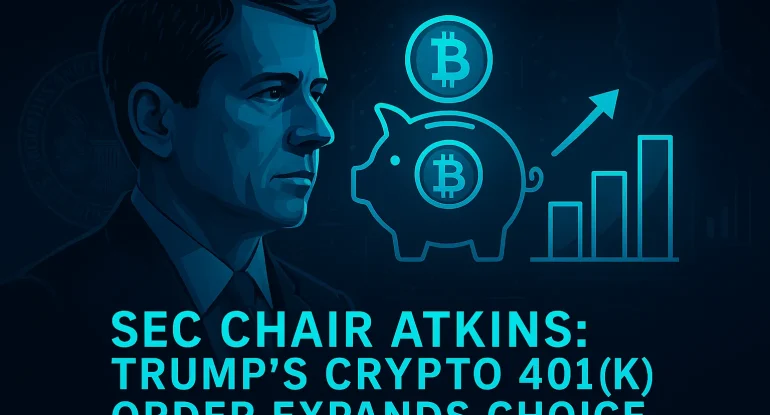SEC Endorses Trump’s Crypto 401(k) Order, Expanding Retirement Options

Key Takeaways
- SEC Chair Paul Atkins highlighted that President Trump’s executive order permitting crypto and private‑equity investments in 401(k)s corrects a long‑standing void in U.S. retirement policy.
- The SEC is revising custody rules to deliver clearer guidance, fostering further innovation in the U.S. crypto market.
SEC Chair Atkins says Trump’s crypto 401(k) order expands choice for retirement savers, reaffirming his backing for President Trump’s executive order that opens 401(k)s to crypto and private equity, promising greater investment alternatives and a more level playing field with traditional pension plans.
“The market landscape has shifted dramatically over the past twenty‑five years, with public companies now numbering only about half of what we saw before,” Atkins remarked on “Mornings with Maria”. “Meanwhile, the private sector has surged, attracting vast amounts of capital eager to find new investment opportunities.”
Atkins explained that this imbalance places individual savers at a disadvantage, as large pension funds and academic endowments readily access private investment opportunities, while ordinary 401(k) participants are still excluded.
By granting 401(k) participants entry into these alternative markets, Atkins believes we can narrow the financial divide.
Still, Atkins cautioned against a hasty rollout, emphasizing the necessity of robust guardrails to educate investors about potential risks.
Under the executive order, the Department of Labor and the SEC will craft a regulatory framework, striving to balance expanded access with safeguarding retirement savers.
“It’s disconcerting that institutions such as state pension funds and sizable endowments are allowed to diversify across public and private arenas, while ordinary 401(k) holders remain excluded,” Atkins noted.
SEC Chair Atkins says Trump’s crypto 401(k) order expands choice for retirement savers
Addressing the newly announced Project Crypto—an initiative reshaping securities legislation for digital assets—Atkins noted the SEC has mobilized all its divisions, from Corporate Finance to Investment Management, to establish transparent, actionable regulations.
He stressed that reforming custody rules to align with crypto assets and blockchain infrastructure tops the SEC’s priority list.
“We’re examining laws that have stood for roughly nine decades and ensuring they evolve to meet the demands of today’s technology. This overhaul will influence broker‑dealers, asset managers, and investment advisors alike,” Atkins clarified.
“Innovation has been hampered by uncertainty and what many would describe as a hostile regulatory climate,” Atkins observed. “Our mission is to deliver clear and consistent guidance.”
“While our actions will be supported by any forthcoming congressional measures, I am confident we possess the regulatory authority to advance these initiatives and furnish investors with the certainty they need,” he added.
On the future of crypto payments, Atkins highlighted how expedited settlements could revolutionize finance.
He explained that expedited settlements shrink the window during which trades face operational or market risk, thereby reducing disruption risk and boosting transparency.
“Blockchain delivers precisely that,” Atkins stated. “It promises benefits for the market that are still immeasurable today.”









